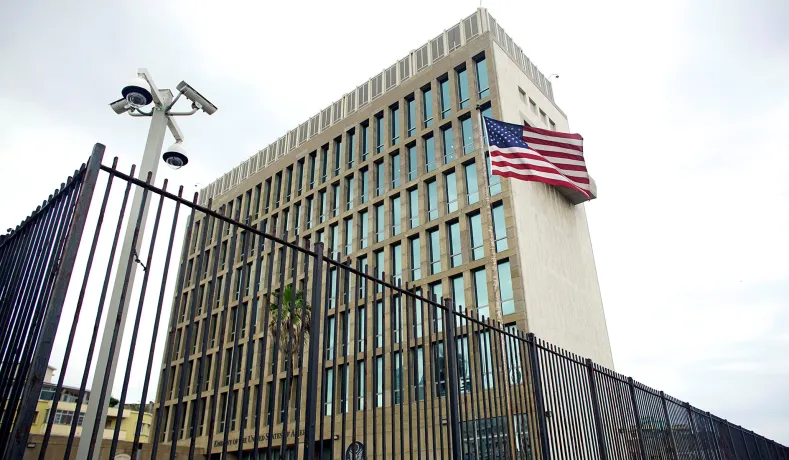
Have Russian operatives used devastating directed-energy weapons against U.S. diplomats and spies posted around the world? A year after the question was supposedly put to rest by a U.S. intelligence assessment finding no involvement of a foreign adversary, new reports point to a possible intelligence-community cover-up.
The question has to do with Havana Syndrome — the nickname given to a group of debilitating symptoms first thought to be experienced by U.S. personnel posted to Havana in 2016. These included intense pressure in their heads, nausea, dizziness, and ear pain. The list of places where these incidents — dubbed “anomalous health incidents” by the U.S. government — have taken place has grown since then, with these possible attacks even taking place in Washington, D.C.
Now, the new findings, presented on Sunday night by a partnership between 60 Minutes, the Insider (a Russia-focused news website), and Der Spiegel, have brought new evidence to bear supporting the thesis that a hit squad from Russia’s GRU intelligence service has carried out these attacks using weapons that direct special microwaves at their targets.
Last year’s unclassified intelligence-community assessment found that “most agencies have concluded it is ‘very unlikely’ a foreign adversary is responsible.”
But new reporting presented on Sunday casts serious doubt on that assessment based on a comprehensive forensic examination of the GRU’s Unit 29155 — a cell known to U.S. intelligence for its role in assassinations and sabotage operations across Europe.
Among other things, the Insider and its partners found travel logs, call metadata, and other evidence that GRU operatives were in the proximity of Havana Syndrome victims in some cases. 60 Minutes reported on a call intercepted in Tbilisi, just before the wife of a U.S. official posted there was hit in her home: “Is it supposed to have blinking green lights?” someone asked in Russian. “Should I leave it on all night?”
The Insider also obtained a GRU document indicating that the cell’s deputy commander was promoted after his team furnished the Kremlin with proof that he conducted research on the “potential capabilities of non-lethal acoustic weapons in combat activities in urban settings.”
Overall, the reporting drives home patterns that have been described before in relation to possible Havana Syndrome cases: The U.S. officials hit are almost always people working on Russia-related issues, often in countries where GRU agents are known to operate.
The Insider also reveals that the two U.S. agencies best placed to understand these incidents, the Defense Intelligence Agency and the National Security Agency, are the most skeptical of the 2023 intelligence-community assessment.
There’s nothing in the new reports that establishes, beyond a reasonable doubt, that the GRU is behind these possible attacks. There’s no single smoking gun.
Yet, at this stage, the possibility that Biden administration officials are downplaying evidence of Russian involvement to avoid forcing Washington into an escalatory confrontation with Moscow is at least as likely to be true as the intelligence community’s conclusion that a foreign adversary is probably not involved.
Consider that the White House has a pattern of opting for an accommodationist approach over forthrightness in dealing with our adversaries. At one point in 2022, the U.S. kept the news of a successful U.S. test of a hypersonic missile under wraps for fear of provoking Moscow; the previous year, the Biden administration instructed the Pentagon to delay the U.S. test of a hypersonic missile ahead of a summit between Joe Biden and Vladimir Putin.
And the administration appears to have blocked the release of a report on the FBI’s analysis of the contents of the Chinese spy balloon, no doubt because Team Biden is pursuing a “stabilization” of the U.S.–China relationship.
The full story about Havana Syndrome is still far from clear, but the latest reporting raises some serious questions about the way that senior officials have handled their responsibility to those serving in the field. It presents the most compelling evidence yet for the possibility that Russia is targeting American officials across the world — a thesis that, if confirmed, will demand a strong U.S. response.
